- Home
- Regan Walker
Summer Warrior (The Clan Donald Saga Book 1) Page 9
Summer Warrior (The Clan Donald Saga Book 1) Read online
Page 9
David and his son appeared bemused, unaware of the earl’s part—or that of his men—in pillaging the isle.
“So, he returned to Orkney?” Somerled asked the earl. He had no doubt Sweyn would again act the pirate given the chance but he would not mention it to Rognvald.
“Aye, with his tail between his legs. You may keep the ship he left behind with my compliments.”
Somerled was amused that Rognvald should think he needed permission to claim a ship he’d won fairly in battle. “Forgive us,” he said to King David, “for speaking of a matter that you may know little of.”
“There is much to discuss,” said the king. “You can explain all to me later. Meantime, Rognvald, take the seat on the other side of Queen Affraic and let us partake of our meal afore it grows cold.” As they claimed their seats, platters of food were immediately placed before them and wine was poured into silver goblets.
Somerled turned to Ragnhild. “Your appearance dazzles, my lady.”
She beamed her pleasure at his words.
“I can only say I am more than glad to see you.”
She returned him a sweet smile. “As am I to see you. I would have thought you off chasing Norse pirates.”
His mouth twitched up at one end. “One does not exclude the other. And, even when I am not with them, my men monitor the isles to discourage pirates.”
The king drew his attention with his words. “My trip to Irvine has brought many here who might not call upon me at my castles in Carlisle and Roxburgh. At Irvine, those who travel by ship can sail nearly to my door.”
“’Tis true,” said Somerled. “We who travel the sea lanes are more comfortable on water than land.”
“Tell me of this ship the Earl of Orkney has allowed you to keep.”
“That ship was one fairly claimed as spoils, Your Grace. Rognvald’s man, Sweyn, attacked the people of Islay and I defended them.”
“Ah, said the king. I have wondered, though Rognvald assures me he is no threat.”
Somerled was disinclined to believe the earl’s motives were pure but he would not slander the man to the King of Scots. “Let us hope that is true.”
David looked across Somerled to Ragnhild, now conversing with de Morville and his wife. “I noticed you have an interest in the Princess of Man. Many other men here do as well.”
“Aye, she is beautiful and intelligent and would make any man proud to have her by his side.”
The king acknowledged the truth of it and expressed his deep felt loss of his queen. “Her presence is missed every day.”
Encouraged by Somerled, David spoke in gracious manner of the years since his wife had died and his plans for Scotland, including the abbeys he had yet to build and how he had changed the administration of his country, patterned after all he had learned in his long sojourn in England.
Somerled thought here is a man who does not put on airs or act in arrogance, demanding his due, but, rather, a man content to be in service to his God and his people. Here was a man Somerled could like.
The music resumed as they partook of the varied dishes set before them. Venison stewed in red wine and spices and roast fowl stuffed with spiced bread were offered them along with vegetables simmered in herbs. Bread, butter and cheese were also placed on the high table.
Though Somerled was fervently aware that Ragnhild was barely inches from him, so close he could smell her rose perfume and feel the heat of her body, he managed to attend to his food. He had not eaten so well since dining with her father.
RAGNHILD’S HEART POUNDED in her chest as she had watched Lord Somerled stride into King David’s hall, unaware she stood among the gathered crowd. Her heart leaped within her to think he was here. Eyeing him pensively, she had noticed a new air of confidence about him in the way he held his head, only hinted at before. She wondered at the battles he had fought in the short time since she had last seen him yet there were no signs of wounds, none visible at least. He walked without hesitation or limp. Ragnhild chided herself for examining his person as might a concerned wife. She had never had such thoughts for another man.
Who was that lovely creature who had followed on his heels, gazing at him with adoration in her beautiful eyes? Even now, she kept watch on him from where she sat at one of the trestles. She could not be a wife as she was not by his side at the king’s table. Who then? A mistress? The possibility grieved Ragnhild.
She had come with her father to King David’s court several days ago, her father now considering King David’s invitation to stay longer. She enjoyed Irvine with its markets where there were goods aplenty. All manner of merchants had come to serve the king and his entourage. And there was hunting in the forests nearby, which she dearly loved.
While Fairhair was not with her, King David and his retinue had brought many horses to Irvine and the castle’s stables were available to his guests. Too, there were interesting women to converse with. She and de Morville’s wife, Beatrice, had become fast friends.
Now that Somerled was here, her spirits rose even higher.
Ragnhild gazed down the table to her right to Rognvald who had come the day before to pay homage to the king and assure him that Orkney had no designs on Scotland. Thankfully, he had left Sweyn behind.
Having reminded her father she did not favor the earl, she hoped Olaf and Affraic discussed no betrothal with him. But her father was ever the statesman, bargaining whatever he had to gain security for his kingdom. And Affraic would see Ragnhild gone if she could.
She stole a glance toward Somerled. He bent his head to speak to King David, one fair and one dark but seemingly of a like mind as they laughed easily together. Her heart had fluttered and her palms grew moist when he looked at her with admiration. One glance from Somerled’s piercing blue eyes could stop her heart.
Perhaps he had not forgotten her. For certes, she had not forgotten him.
THE KING SET DOWN his wine and glanced in Somerled’s direction. “How did you come to the position you now hold as leader of the Gaels?”
“I did not seek to be their chief or their king, if that is what you are asking, Your Grace. When the MacInnes Clan lost their chief to the Norse pirates, they came to me to lead them.”
“Ah. We have that in common, for never did I, the youngest son, believe I would wear Scotland’s crown.”
Somerled nodded, glad that David and he shared a similar beginning—both of royal linage but without expectations of rising to lead a kingdom. “The people of Argyll and the Isles were suffering under the Norse yoke,” he went on. “I accepted their request to help them throw it off.”
“For that, you have my gratitude,” said David. “I have been concerned about the continued attacks of the pirates on the Isles and Scotland’s coast but with little time to attend to it. Only recently did we send the Norse invaders fleeing from the Firth of Clyde’s Isles of Arran and Bute.”
“I, too, have worried over those isles,” Somerled said. “In the hands of the Norse, they would present a threat to the whole of southern Argyll, especially Kintyre.”
“For protecting Scotland’s western coast, I am inclined to grant you a boon,” said the king. “Is there something you would have of me?”
Somerled took a deep breath, praying his plans wouldn’t offend the Scots king. “Aye, there is. To hold the sea lanes free, I must build fortifications in strategic places. Not just timber castles,” he said, looking up at the rafters, his hand raised, “though this is a fine one. I wish to construct stone towers like the Normans built, and as you are building in other parts of Scotland. For that, I would seek your approval and, were you willing to part with skilled masons, I have need of them. My people can quarry stone, crush shells for mortar and cut timber for scaffolding, but they have not the skills to design and construct a stone edifice.”
David smiled, his ringed fingers gripping his goblet. “I have some thoughts on the matter, but I need to make inquiries. Let us speak again tomorrow. There may be things I would ask of you as
well.” Turning the goblet in his hand, he said, “A hunt is planned for the morning. Perhaps you and your companions might like to participate? My constable’s stables are at your disposal. I suppose I should ask if you ride as well as sail?”
Somerled chuckled. “I do. The coming of the Norse exiled my family to Ireland where I lived as a boy. I learned letters and Latin from the Culdee monks and the ways of a horse from the great horse lords in my mother’s family.”
The king nodded. “I know well the good teaching of the Culdees. They were the priests who taught my father King Malcolm. But my lady mother wanted the church in Scotland to be tied to Rome.”
“I would have Argyll and the Isles free,” said Somerled. “I fear the yoke of Rome could be as oppressive as that of the Norse.”
David gave him a measured look.
Somerled met his gaze and did not look away.
“Very well,” said the king. “Tomorrow it is. Meantime, enjoy the pleasures of my court.” He turned to converse with his son, leaving Somerled free to speak again with Ragnhild.
“I know you can ride,” he said to her, “but do you hunt?”
The green of her eyes, deeper in color in the evening, glimmered in the candlelight. “Of course. I learned the way of the bow as a young child, taught to me by my father’s men.”
“Then I shall look forward to joining you on the hunt tomorrow. The king has invited me and my companions to take part.”
“I was hoping he would,” she said, her smile brilliant.
AS THE MUSICIANS BEGAN to play, Ragnhild accepted Somerled’s invitation, thrilled he had been the first to ask, for she had hoped to dance with him. There were other men with whom she would dance but none like Somerled. She liked Prince Henry’s gentle ways and would have happily partnered with him but Earl Rognvald she would try to avoid.
Once the trestles were taken down and the musicians readied their instruments for more lively tunes, the dancers took to the floor. With each touch of Somerled’s strong hands, each smile he gave her, she felt a contentment she had not previously known, a joy in his presence.
“Will you stay long at Irvine?” she asked.
“I cannot say. It depends upon the king.” Somerled’s blue eyes alighted with mischief. “And you.”
“Me?”
“Aye. I have business with King David but had I known you were here, I would have come even without that purpose.”
When the music stopped. Earl Rognvald came to stand in front of her. As always, his long chestnut hair was in perfect order and his clothing fine, his tunic crimson silk, embroidered in golden thread, his trousers blue. Around his shoulders, he wore an ermine-trimmed woolen mantle in the deepest shade of woad blue.
“I have written you a poem, Princess. A tribute.”
Inwardly, she groaned. Glancing at Somerled, who had stepped back and lifted a brow at the earl, she said, “Say on.”
“The verses came upon me as you entered King David’s hall this eve,” said the earl, and he began to recite.
Golden one, tall one
Moving in perfume and onyx
Witty one, you with the shoulders
Lapped in long silken hair
Listen: because of me the eagle has a red claw
Behind Rognvald, Somerled covered his mouth and looked at his feet.
She considered the poem a bit outlandish and the last line, a reference, she presumed, to Rognvald’s warlike ways, served little purpose as a tribute to a lady. Rather, it reminded her of the rumors he was responsible for the disappearance of Earl Paul.
Fingering the onyx beads at her neck, she said, “You do have a way with words, Lord Rognvald.”
The Norseman returned her a possessive grin. “I would have you know of my fondness for you, Princess.” With a glower in Somerled’s direction, he added, “That last verse assures you I am strong and will guard my own even drawing blood if I must.”
Before she could reply, Rognvald asked her to partner for the next dance. With reluctance she placed her hand on his offered arm and allowed him to lead her to the new circles just forming.
Glancing over her shoulder, she met Somerled’s intense gaze. He was not pleased.
INWARDLY, SOMERLED FUMED as he watched the Norseman dancing with Ragnhild, sending her frequent lust-filled glances. It was time for Somerled to speak to Olaf again concerning his daughter.
“How fares the Princess of Man?” Angus asked as he, Domnall and Maurice came to join him.
“Well enough by the look of her,” replied Somerled. “Still, there are too many suitors here for my liking.”
“Would you compete with them for her?” asked Domnall. “It does seem time for you to consider marrying again, and where you once had nothing to commend you, now you have a growing kingdom. She would be a fine bride with an unmatched dowry.”
“Aye, he would be her suitor,” interjected the older Maurice, his curly dark hair grown longer since their first voyages. “An alliance with the King of Man would gain our lord much more than he has now.”
Angus ran his hand through his hair, as long as Somerled’s but darker. “I sense it is the lady herself my brother wants as much as Olaf’s gold or his lands.”
“Enough!” Somerled scolded. “At the moment, I have no castle to offer and gold enough only for my ships and my men. Though, now that I think on it, when we leave here, after stopping at Kintyre, I would like to return to Islay and begin work on a timbered lodge on the island in Loch Findlugan. We need no mason for that. And, lest you worry that all my thoughts are for the princess, I do not forget the Norse menace.”
“Which reminds me,” said Domnall, “what is the Earl of Orkney doing here?”
“Since he has no daughter to offer David’s son, I suspect he came to assure the king he poses no threat to Scotland,” replied Somerled, continuing to watch Ragnhild dancing with the earl. “And, since Olaf is conveniently here, Rognvald is likely to again take up his quest for the princess’ hand.”
“By the look on her face,” said Angus, “’twould seem she is not warm to that prospect.”
THE NEXT MORNING Somerled and his brother, after having a word with the stable master, took up their bows and quivers of arrows and headed to the streambank where David and his company were breaking their fast as was the custom before a hunt if the weather was fair. Domnall and Maurice had not wished to participate in the hunt but offered to stay behind and secure the provisions they needed.
The day presented all they could hope for in weather, the sky nearly cloudless and the leaves on the trees that had changed with autumn were ablaze with red, yellow and gold. The air, too, spoke of autumn, being dry and crisp.
Somerled was nearly to the gathering of hunters when Liadan rushed up to him, breathless. A look of concern shadowed her face. “I am glad I found you, Lord. I have heard something that concerns me.”
“What is it?”
Angus furrowed his brow, intent upon the news she carried.
“I heard the Norseman, Rognvald, tell one of his men that he would deal with ‘that bastard Gael’ afore the hunt was done.”
Somerled cast a glance toward those who sat in the clearing just ahead. The Earl of Orkney was nowhere to be seen. “He does not hunt this morning.”
“Might he not set a trap somewhere along the route?” offered Liadan.
“The woods in which we hunt are dense,” said Angus. “Best be on your guard, Brother.”
Somerled gripped his bow tighter and turned to Liadan. “You have my thanks, lass.”
Her dark eyes conveyed anxiety as she wished him well.
He and Angus joined the gathered assembly seated at tables arrayed on the streambank.
The men were richly attired. All carried weapons—spears, swords, bows and daggers of one sort or another.
Spotting Ragnhild sitting with her father, he went to join them, while Angus bid him a good hunt and ventured on to another group.
The princess had foregone a veil and con
fined her hair to one long plait. Her green bliaut was simple with a wide skirt for riding. At her side was a bow and a quiver of arrows. “We are waiting for the huntsmen to return with news of the harts. Join us.” She swept her hand toward an empty bench.
“Happily.” He greeted King Olaf and accepted the open seat.
As they partook of the meal of bread, bacon, smoked fish and apples, Somerled asked Olaf, “Will you participate in the hunt?”
“Nay and neither will David,” he said, glancing at King David speaking with his men at a nearby table. “We have agreed to wait for you young ones to return.”
“We did not see you at Mass,” remarked Ragnhild, her delicate fingers holding a piece of bacon before her lovely mouth.
“I first had to see to my ship and my men, else I would have attended.” Though that was truth, Somerled preferred the Culdee services. Still, he would have made an effort to attend just to be with her had he known she would be there.
The huntsmen in their green garb and hats returned, telling the Master of the Hunt they had spotted several harts, at least one of which possessed ten tines on his antlers.
The deerhounds, waiting with their keeper and sensing the hunt was about to begin, whined and strained at their leashes. At the instructions from the Master of the Hunt, the huntsmen took the hounds forward to be stationed along the expected route the hart would take.
Somerled quickly finished his meal and rose with Ragnhild and the other hunters, who were heading to their horses. One of the grooms brought a chestnut courser to him. “He’s swift and sure, my lord. A good horse for the hunt.”
“My thanks,” said Somerled. He checked the cinch and stirrups, then mounted and walked the horse to join Ragnhild, who was stowing her bow and arrows in a leather bag tied to the saddle of a black palfrey. “You ride another horse today.”
“I do. Fairhair stayed on the isle. I miss him, but King David’s constable has been most gracious to offer the use of his stables.”
The hunting horn sounded a double note to signal that the hunt had begun. In the distance, the braying of the hounds echoed through the woods.

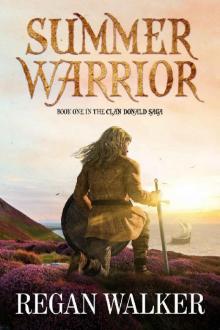 Summer Warrior (The Clan Donald Saga Book 1)
Summer Warrior (The Clan Donald Saga Book 1) Echo in the Wind
Echo in the Wind Once Upon a Christmas Past
Once Upon a Christmas Past A Secret Scottish Christmas (Agents of the Crown Book 4)
A Secret Scottish Christmas (Agents of the Crown Book 4) The Holly and the Thistle
The Holly and the Thistle Racing with the Wind (Agents of the Crown)
Racing with the Wind (Agents of the Crown) Wind Raven (Agents of the Crown)
Wind Raven (Agents of the Crown)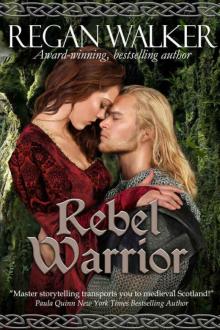 Rebel Warrior (Medieval Warriors #3)
Rebel Warrior (Medieval Warriors #3)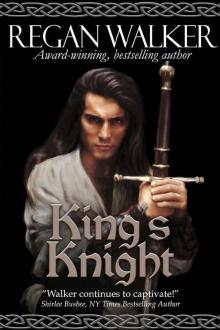 King's Knight (Medieval Warriors Book 4)
King's Knight (Medieval Warriors Book 4)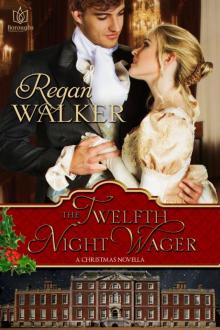 The Twelfth Night Wager
The Twelfth Night Wager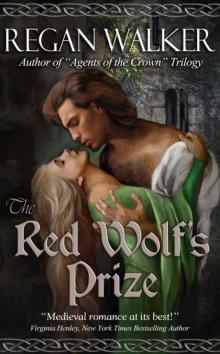 The Red Wolf's Prize
The Red Wolf's Prize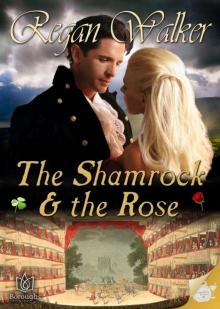 The Shamrock & the Rose
The Shamrock & the Rose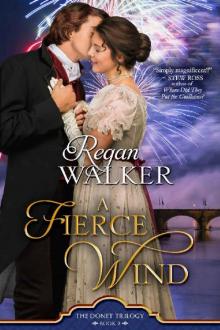 A Fierce Wind (Donet Trilogy Book 3)
A Fierce Wind (Donet Trilogy Book 3)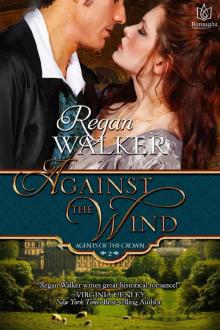 Against the Wind (Agents of the Crown Book 2)
Against the Wind (Agents of the Crown Book 2)